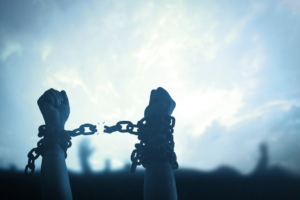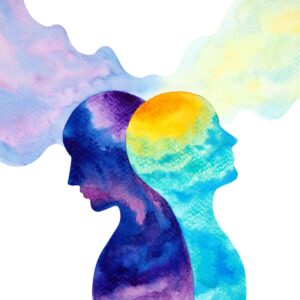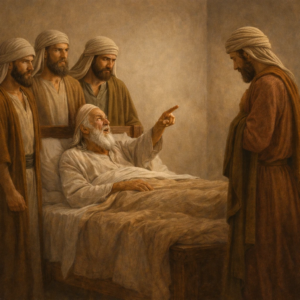THE POWER OF THOUGHT (PART I)
Our thoughts are our constant companions. They don’t even leave us when we sleep!
More than anything or anyone else, our thoughts are our constant companions. They don’t even leave us when we sleep. Our minds – which is where we spend most of our lives – experience alternating periods of Darkness and Light, of turmoil and resolution. What’s more as Rebbe Nachman said, wherever your mind is – that’s where you are! (Likutey Moharan I, 21:end). If your mind is experiencing confusion and a lack of knowledge, it’s Night, no matter what your watch shows. You’re “in the Dark.” On the other hand, if your mind is alert and filled with clarity and wisdom, aren’t you seeing the Light of Day? In fact, Light is always being associated with creative problem-solving: viz. “the light bulb” which turns on when you have a bright idea.
Realizing that our thoughts are so much a part of us and make so much of a difference in how we live life, Rebbe Nachman saw fit to focus so many of his teachings on precisely this area. What the Rebbe was saying is: It all depends on your attitude. Do you see Night as a threat, or as a creative challenge? Are you cowered by Darkness, or does it motivate you to greater heights?
Night… You should know that when you find yourself confronted by evil or confusing thoughts and you overpower them, God takes great pleasure in this. It is very precious in His eyes. This can be likened to the sporting competitions that were held in stadiums to entertain the king. These battles between beasts were observed by the king and his entourage who took great pleasure in the victory of the conqueror. It is similar with our thoughts. our evil and confusing thoughts are like the impure beats, our good thoughts are like the pure beasts. The “beasts” of our minds are made to combat each other. It pleases God greatly when we overcome the impurities (Likutey Moharan I, 233).
Rebbe Nachman teaches: We have always to strengthen ourselves to overcome evil and confusing thoughts. These thoughts come to a person constantly, daily. The consciousness of man rises to do battle with the forces of the subconscious. it does not help to shake our heads back and forth, thinking maybe this will shake off the bad thoughts. We have to oppose them, as if in battle. This is accomplished by creating a diversion, by thinking other thoughts – as if moving the battle to a different arena. By thinking other thoughts, we can overcome the Darkness which leads us to passions and desires (Likutey Moharan I, 72). Thus Rebbe Nachman once remarked: Controlling the mind is as easy as leading a horse. You only need to grab hold of the reins (Likutey Moharan II, 50).
Do you see Night as a threat, or as a creative challenge? Are you cowered by Darkness, or does it motivate you to greater heights?
The Rebbe therefore teaches: It is impossible for two thoughts to occupy the mind at one time. It is easy to push away the evil thoughts if one wishes. All we have to do is divert our minds to Torah, prayer, business, whatever; as long as it is permissible. For it is impossible for two thoughts to be in one’s mind at the same time. Then, the bad thoughts will eventually go away (Likutey Moharan I, 233).
But aren’t we capable of thinking a few things at once? Yes… but. Although a few things may enter the mind at the same time, only one of them can remain there. Rebbe Nachman once remarked that the Evil One is a sly character. He comes knocking on your mind. If you allow him to enter, he comes in and takes over, and if you repel him, he goes away and comes knocking again later on. But if you keep up the battle and not give in, he will eventually go away and not return (Likutey Moharan II, 51). Take some time to follow your thought process. See how one thought leads to the next, and how that one takes you to the one after it, and so on. Thoughts enter and leave quickly – very quickly. If they are given credence, they remain, but, if they are shrugged off and considered of no value, they will have been successfully chased away.
Reb Noson writes: The “battle of the mind” is compared to the battle that the Jews had with Amalek. Amalek would come stealthily, in a rear-guard action, launching sneak attacks at different intervals. So too, “Amalek” infiltrates our mind, planting seeds of atheism, of immorality, etc. The Torah therefore commands each and every Jew constantly to remember the battle of Amalek, and never forget it (Deuteronomy 25:17-19).
Furthermore, Amalek (עמלק) has the same numerical value as doubt (ספק), 240. All the doubts that pervade our minds, all our uncertainty in how to proceed in life, and especially in serving God, stems form “Amalek.” We must constantly strive to control our thoughts. Where these doubts exist, we must pour out our hearts with prayer, asking God Himself to wage His war with “Amalek” and destroy them (Exodus 17:16; Likutey Halakhot, Minchah 7:19, 30).

Yet another very important aspect of Night and Darkness with respect to our thoughts has to do with the concept of hastarah (the hidden) and hastarah within the hastarah (hidden within the hidden).
Rebbe Nachman teaches: There are times when we feel distant from God. God is hiding Himself from us because of something we’ve done. We are within a hastarah. Though it is difficult enough to find Him at this time, at least we know that we must search for God until we merit finding Him. But, there is a worse case of hiddenness, the hastarah within the hastarah. In such a situation, it never dawns upon us even to think that we are distant from God. However, by studying Torah, we acquire the knowledge to awaken ourselves out of our hastarah and out of our hastarah within the hastarah (Likutey Moharan I, 56:3).
We walk around, everyone of us thinking that there is no hastarah in our lives; that in one way or another we have found God, we have “seen the Light.” But have we? We talk about Him. We mention His Name. We every pray to Him. But are we aware of Him? Have we really searched for God? Or are we calling the Night “Day”? Are our minds so befuddled by Darkness that we no longer make any effort to truly find Him? We must bring the light of Day – awareness – into our lives. We must awaken ourselves with Torah study and with hitbodedut.
(Taken from the book Crossing the Narrow Bridge – chapter 11 – Day and Night)
- 0 comment






















